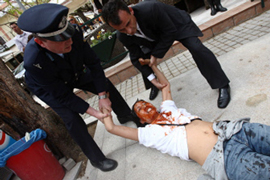Rogge: Pollution won’t harm health
The IOC president talks down the health impact of Beijing pollution.

 |
| Air-pollution remains an issue in Beijing [AFP] |
IOC President Jacques Rogge said pollution in Beijing will not endanger the health of athletes, although their Olympic performance might suffer.
Speaking on a visit to Singapore, Rogge also said there he saw no momentum toward boycotts of the Olympics over political issues, and that he was unhappy with protests during the torch relay but accepted people’s right to demonstrate.
But Rogge seemed to be softening his previous hardline about ensuring that air-pollution would be acceptable for athletes.
“The health of the athletes is absolutely not in any danger,” Rogge said.
“It might be that some will have to have a slightly reduced performance, but nothing will harm the health of the athletes. The IOC will take care of that.”
Rogge was asked to comment on the decision by Haile Gebrselassie, the world’s greatest distance runner, not to run the men’s marathon in Beijing because of worries over pollution.
“Haile Gerbrselassie is arguably the best long-distance runner of the present generation,” Rogge said, adding however, that the runner is “slightly asthmatic.”
Rogge was not ruling out the possibility that Gebrselassie could change his mind nearer to the date.
“He decided so far, I’m saying so far because we don’t know how things will evolve, not to participate in the marathon,” he said.
“I would say, wait and see … when he sees the data that we are providing for them.”
Rogge had previously said outdoor events in August’s games could be delayed if the air quality was too poor.
Pollution, in addition to the violence in Tibet and other human rights issues, had been a major concern for China and the International Olympic Committee in the leadup to the August 8-24 Olympics.
Some athletes are reportedly considering wearing masks to ward off the bad air in Beijing, while many will delay their arrival in China’s capital until the last possible moment.
Tibet concerns
The Tibet protests and other human rights issues had led activists to call for boycotts of the Beijing Olympics, and some high-ranking political leaders, including French President Nicolas Sarkozy, had said they may boycott the opening ceremony.
“We are not seeing a real momentum on boycotts by governments,” Rogge said.
“There are talks about the potential boycotts of the opening ceremony.
“It is up to the heads of government to decide if they want to come to Beijing or not.”
The early stages of the torch relay had attracted protests by activists, mostly concerned with Tibetan sovereignty, and more were expected as it travelled through western Europe and the United States.
 |
| Rogge supports peaceful protests [AFP] |
“We are definitely not happy with the protests,” Rogge said.
“If people want to protest, we are for the freedom of speech and expression. They can protest as long as it is not violent.”
Rogge said the IOC executive committee, in a meeting on April 10, would examine the latest report by human rights group Amnesty International which was damning of China’s lack of progress on such issues as detention without trial, repression of human right activists and internet censorship.
Rogge and IOC executive board member Sergei Bubka travelled to Singapore to observe preparations for the first Youth Olympic Games to be held there in 2010.
The Youth Games will feature about 3,200 athletes aged 14-18 competing in 26 sports.
Rogge said the Youth Games would encourage youngsters who were too attached to television sets and computers to be more active.
“We’ve seen a drop in physical fitness and a rise in obesity in most of the countries and this is one of the reasons … why we created this Youth Olympic Games: to bring back young people to sport,” he said.
Singapore, with a games budget of $75 million, will use 24 venues, including one large cluster for 13 sports.
Nineteen of the venues already exist, four would be built as temporary facilities and one is under construction for equestrian.
The Southeast Asian city-state of 4.5 million people beat out Moscow in an IOC vote announced in February.